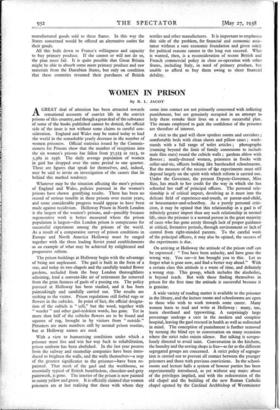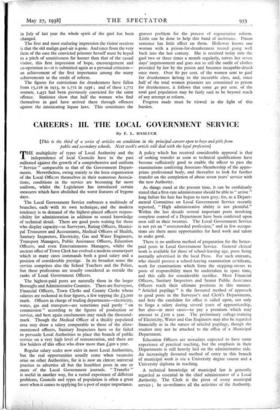WOMEN IN PRISON
By B. L. JACOT AGREAT deal of attention has been attracted towards sensational accounts of convict life in the convict prisons of this country, and though a great deal of the substance of some of the books published- cannot,.be denied, the official side of the issue is not without some claims to careful con- sideration. England and Wales may be stated today to lead the world in the remarkable yearly decrease in the number of women prisoners. Official statistics issued by the Commis- sioners for Prisons show that the number of receptions into the six women's prisons has fallen from 37,523 in 1913, to 5,389 in 1936. The daily average population of women in gaol has dropped over the same period to one quarter. These are figures that speak for themselves, and, indeed, may be said to invite an investigation of the causes that lie behind this marked tendency.
Whatever may be the situation affecting the men's prisons of England and Wales, policies pursued in the women's prisons have shown gratifying results. There has been no record of serious trouble in these prisons over recent years, and some considerable progress would appear to have been made against recidivism. Holloway Prison in North London is the largest of the women's prisons, and—possibly because regenerative work is better measured where the prison population is largest—this London prison is conspicuous for successful experiment among the prisons of the world. As a result of a comparative survey of prison conditions in Europe and North America Holloway must be ranged together with the three leading Soviet penal establishments • as an example of what may be achieved by enlightened and progressive reform.
The prison buildings at Holloway begin with the advantage of being not unpleasant. The gaol is built in the form of a star, and today its two chapels and the carefully tended flower gardens, secluded from the busy London thoroughfares adjoining, lend a convent-like air of retirement far removed from the grim fastness of gaols of a passing era. The policy pursued at Holloway has been studied, and it has been painstakingly and carefully carried out. The results are striking to the visitor. Prison regulations still forbid rugs or flowers in the cubicles. In point of fact, the official designa- tion of the cubicle is "cell," but the word, together with " warder " and other gaol-redolent words, has gone. Yet in more than half of the cubicles flowers are to be found and squares of rug, brought in by visitors from "outside." Prisoners are mere numbers still by normal prison routine, but at Holloway names are used.
With a view to htunanising conditions under which a prisoner must live and win her way back to rehabilitation, prison uniform has been abolished. In the last year posters from the railway and steamship companies have been intro- duced to brighten the walls, and the walls themselves—a step of the greatest significance to the prisoner—have been re- painted. That mark of the gaol and the workhouse, so essentially typical of British bumbledom, chocolate-and-grey paintwork, is gone. The interior of the prison is now painted in sunny yellow and green. It is officially claimed that women prisoners are at last realising that those with whom they come into contact are not primarily concerned with inflicting punishment, but are genuinely occupied in an attempt to help them remake their lives on a more successful plan. The means employed to gain the confidence of the prisoner are therefore of interest.
A visit to the gaol will show spotless rooms and corridors ; comfortable beds with clean sheets and pillow cases ; wash- stands with a full range of toilet articles ; photographs (running beyond the limit of family connexions to include male film stars) round- the cubicle walls ; gardens ablow with flowers ; neatly-dressed women, prisoners in frocks with collar-and-tie, officers looking like bareheaded schoolmarms. But the measure of the success- of tlie experiments must still depend largely on the spirit with which reform is carried out. Under the Governor, the present Deputy-Governor, Miss Size, has much to her credit for the way in which she has schooled her staff of principal officers. The personal rela- tionship is of critical import, devolving as it must into the delicate field of experience-and-youth, or parent-and-child, or housemaster-and-schoolboy. As a 'purely personal criti- cism, it may be opined that this relationship in a gaol is of infinitely greater import than any such relationship in normal life, since the prisoner is a normal person in the great majority of cases who has gone astrdy through lack of proper guidance at critical, formative periods, through environment or lack of control from right-minded parents. To the careful work of the principal officers, it may also be opined, the success of the experiments is due.
On arriving at Holloway the attitude of the prison staff can be expressed : "You have been unlucky, and have gone-the wrong way. You see—it has brought you to this. Let us forget what is gone now, and find a better way ahead." With a certain class this attitude is a waste of time, and definitely a wrong step. This group, which includes the alcoholics, is beyond reach. But with those finding themselves in prison for the first time the attitude is successful because it is genuine.
A wide variety of reading matter is available to the prisoner in the library, and the lecture rooms and schoolrooms are open to those who wish to work towards some career. Many women learn to read and write at Holloway many, too, learn shorthand and typewriting. A surprisingly large percentage undergo a cure in the modem and complete hospital, leaving the gaol rescued in health as well as redirected- in mind. The conception of punishment is further removed by turning the blind eye to conversation on many occasions where the strict rules enjoin silence. But talking is scrupu- lously directed to avoid taint. Conversation in the kitchens, the laundry and the sewing shops is free—as far as the different segregated groups are concerned. A strict policy of segrega- tion is carried out to prevent all contact between the younger prisoners and those with previous convictions. In the school- rooms and lecture halls a system of-honour parties has been experimentally introduced, as yet without any major abuse of the privileges implied, and with the redecoration of the old chapel and the Wilding of the new Roman Catholic chapel opened by the 'Cardinal Archbishop of Westminster in July of last year the whole spirit of the gaol has been changed.
The first and most enduring impression the visitor receives is that the old malign gaol-air is gone. And since from the very facts of the case the convicted prisoner herself must be keyed to a pitch of sensitiveness far keener than that of the casual visitor, this first impression of hope, encouragement and co-operation is—it is submitted again as a personal criticism— an achievement of the first importance among the many achievements to the credit of reform.
The figures for convictions for drunkenness have fallen from 15,116 in 1913, to 1,772 in 1936; and of these 1,772 women, 1,452 had been previously convicted for the same offence. Statistics show that half the women who find themselves in gaol have arrived there through offences against the intoxicating liquor laws. This constitutes the gravest problem for the process of regenerative reform. Little can be done to help this band of inebriates. Prison sentence has little effect on them. Holloway knows one woman with a prison-for-drunkenness record going well back into the last century. She is received today into the gaol two or three times a month regularly, serves her seven days' imprisonment and goes out to sell the outfit of clothes provided by law by the prison and becomes incapable-drunk once more. Over 8o per cent. of the women sent to gaol for drunkenness belong to the incurable class, and, since half of the total women prisoners are committed to prison for drunkenness, it follows that some 40 per cent. of the total gaol population may be fairly said to be beyond reach of any attempt at reform.
Progress made must be viewed in the light of this burden.



















































 Previous page
Previous page